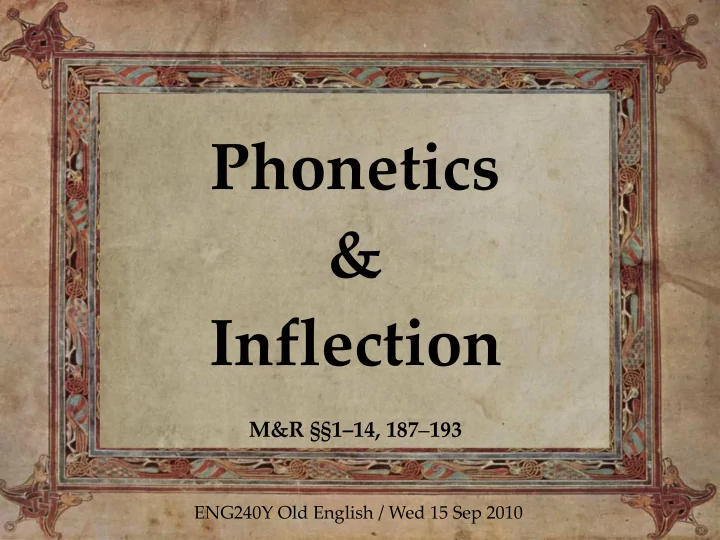

Phonetics & Inflection M&R §§1–14, 187 – 193 ENG240Y Old English / Wed 15 Sep 2010
Vowel system
Vowel system
Vowel system
Vowel system by graphemes
Consonants to watch c - /k/ when not adjacent to i or e - / / before or after i or e (historically!) / / cc /d / cg g - /g/ before back vowels and æ - / / or /j/ in ge- prefix, before i, e , and y - / / between back vowels h - / h / initially before a vowel - /x/ or / / in other positions / / sc f , s , þ , ð - /f/, /s/, / / when initial, final, or adjacent to a voiceless sound - /v/, /z/, /ð/ between voiced sounds
Consonants to watch cunnan, corn, cald, cyning, cǣg, bacan, bōc, bæc c /k/ cēap, ciele, rǣcan, mislic (but /k/ in cearo ) c / / reccan, wiccecræft (but /kk/ in, e.g., folccyning ) cc / / ecg, secgan, fricgan cg /d / gālan, gold, guma, gæf g /g/ g / /,/j/ gerēfa, gieldan, geong, gȳman āgan, flēogan, gioguð g / / hund, helpan hweorfan, ahsian h /h/ h /x/ scip, gesceaft, scōh sc / / faran, rēaf lafian, rēafode f /f/ f /v/ sacerd, forst, gymelēas drēosan, gymelēase s / z / s /s/ þorn, forð þ,ð /ð/ baðian, brōþor þ,ð / /
Sample sentences ● Flōd blōd gewōd. ● Geweorðod ofer werþēoda. ● Hwȳ þū lā drihten ǣfre woldest þæt sēo wyrd swā hwyrfan sceolde? ● Ne sēce ic nō her þā bēc, ac þæt ðæt þā bēc forstent.
Inflection nominals inflect for case, number, and gender: ● case: nominative, accusative, genitive, dative, instrumental ● number: singular, (dual,) plural ● gender: masculine, neuter, feminine ● pronouns also inflect for person: first, second, third verbs inflect for person, tense, number, and mood: ● person: first, second, third ● tense: present, preterite ● number: singular, plural ● mood: indicative, subjunctive, imperative NB: Old English has no inflectional passive voice.
Case (basic uses) Nominative subject case (who does the action?) The baker gave the butcher a shepherd’s pie. Accusative direct object case (who/what is being somethinged?) The baker gave the butcher a shepherd’s pie. Genitive possession case (whose?) The baker gave the butcher a shepherd’s pie. Dative indirect object case (to whom is the action of relevance?) The baker gave the butcher a shepherd’s pie.
Old English cases Nominative subject, subject complement, address Accusative direct object, object complement Genitive possession, description, adverbial uses (note the partitive genitive construction) Dative interest, possession, adverbial uses (e.g. time), comparison, (absolute) Instrumental means/manner, comparison, (accompaniment), time
Old English cases ● Se cyning is gōd Nominative ● Ælfred wæs Westseaxna cyning ● Lā ælmihtiga God and ealra cyninga cyning ● Ic gesēo mīnne cyning Accusative ● Þū hine ongēate unweorðne ● Æðelflǣd wæs þæs cyninges dohtor Genitive ● Angle sind swā fægeres hiwes menn ● Hē wunode on dūnum dæges and nihtes ● Fīftȳna sum sundwudu sōhte ● Se wæs þāra manna mōdgast ealra
Old English cases ● Hē geaf his dohtor Burgrēde cyninge Dative ● Þā wearð God þām werode wrāð ● Him wæs þearf micel ● Dægtīdum ic oft spǣte sperebrōgan ● Hīe wǣron englum gelice ● (Þām gedōnum andswarige eall chor) ● Se palm þe drihten sylf sette his āgenum Instrumental handum ● Þā wæs gāst ofer holm boren miclum spēdum ● Þȳ geare wæs senoð æt Heorotforde ● Barrabas wæs þǣr þȳ sīðe on bendum ● Man bið þȳ strengra þe hē bið micel on his lichoman ● Ic ðē mæg sum bispell secgan, þæt þū meaht þȳ sweotolor ongitan
Old English cases In addition, a large number of prepositions and verbs require one of the oblique cases, and often two are possible. e.g. be ‘about, near’ + dat. be streame ymb ‘about, after’ + acc. ymb stream andlang ‘along’ + gen. andlang streames mid ‘with’ + dat./acc./inst. mid stream(e) wið ‘against, towards’ + acc./dat. wið stream(e) See further M&R §214
Recommend
More recommend